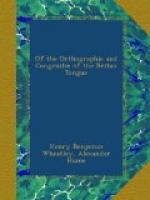9. We have in our use the sam soundes q_uhi_lk it seemes these consonantes had in Plutarch’s dayes, as in yallou, winter. Quhilk, seeing now they are worn out of the latin use, my counsel is that we leave the sound of them q_uhi_lk now is in the latin use to the latines, and take as our’s the sound q_uhi_lk they have left, and geve to the sound, q_uhi_lk now we use in latin, the latin symbol; as, jolie jhon; vertue is not vain; and to the soundes quhilk they have left the symboles q_uhi_lk we have usurped to that end; as, yallou, youk; water, wyne.
10. And heer, to put our men af their errour quho had wont to symboliz yallou with an {gh}, and to put noe difference betueen v and w, {gh} is a dental consonant, broaken betueen the top of the tongue and root of the teeth; yal, a guttural sound, made be a mynt of the tongue to the roofe of the mouth, and therfoer the organes being so far distant, and the tuich so diverse, this symbol can be no reason serve that sound, nor nane of that kynd.
11. As for v and w, seeing we have in our idiom, besyd the latin sound, an other never hard in latin, as now it is pronu_n_ced, I can not but com_m_end the wisdom of the south, q_uhi_lk gave the latin sound their awn symbol, and took to our sound a symbol quhilk they use not. Lyke was their wisdom in j and y; for as the latines usurped the voual i for a consonant in their use, q_uhi_lk the greekes had not, so they usurped y, a voual not mikle different from i, for the correspondent sound, not used in the latin as now it is pronu_n_ced.
12. Heerfoer, for distinctiones of both sound and symbol, I wald commend the symbol and name of i and u to the voual sound; as, indifferent, unthankful; the symbols of j and v to the latin consonantes, and their names to be jod and vau; as, vain jestes; and the symboles y and w to our English soundes, and their names to be ye and we, or yod and wau; as, yonder, wel, yallou, wool.
13. Now remaineth h, q_uhi_lk we have called a noat of aspiration, cap. 2, sect. 2, and is, in deed, noe voual, because with a consonant it makes noe sound; as, ch; nor consonant, because it is pronu_n_ced without the tuich of the mouth; as, ha.
14. It may affect al vouales and diphthonges; as, hand, hen, hind, hose, hurt, hail, hautie, health, heel, heifer, etc. But behind the voual in our tong (so far as yet I can fynd) it hath no use. Of consonantes, it affecteth g beyond the voual; as, laugh; p befoer the voual; as, phason; s and t also befoer the voual; as, think, shame. With c we spil the aspiration, tur_n_ing it into an Italian chirt; as, charitie, cherrie, of quhilk hereafter.
OF OUR ABUSING SUM CONSONANTES.
Cap. 5.
1. Now I am cum to a knot that I have noe wedg to cleave, and wald be glaed if I cold hoep for help. Ther sould be for everie sound that can occur one symbol, and of everie symbol but one onlie sound. This reason and nature craveth; and I can not but trow but that the worthie inventoures of this divyne facultie shot at this mark.




